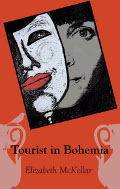Reviews
|
“I found the novel easy to read and perfectly absorbing: the character of
Grenville is very beguiling, he really stays in the mind. The dialogue is very
good, particularly with Grenville and Yasmine. The book is both funny and
genuinely moving.”
Maggie Evans, reader at David Higham Agents. 2007
“I really enjoyed reading Tourist in Bohemia and thought that it was lots
of fun (and sad too). There are some great characters and the book really
captures the atmosphere of the time. I think lots of people would enjoy the
novel, both for the fun and frolics of the transgressive world created for us
and because it has some important questions about ‘the way we live
now’. There
are some really interesting things done with dialogue and there are some really
lovely metaphors and images throughout.”
Amanda Boulter, novelist Around the Houses Serpents Tail. 2002
“I enjoyed Tourist in Bohemia enormously. It’s pacy and racy and
hugely entertaining... I had difficulty with Grenville at first. Reading the
opening chapter is like standing in the path of a charging rhino. I expect this
is the effect the writer was aiming for, in imitation of Eleanor’s early
impression of living with him... and his opinions which are exasperating for
being based on daft (now outmoded) Reichian ideas about sex being the salvation
of the world. But he fills out, we discover who he really is and I really
warmed to him. The secondary characters, especially Yasmine, Sandra, Marty and
Tinker are wonderfully ‘there’. The writer has a great ear for dialogue
and recreates the feel of the eighties vividly. ”
Les Brookes: author of Gay Male Fiction Since Stonewall. Routledge 2009
Grenville is one of the most memorable characters in recent fiction.
Maddening and majestic, his inimitable voice rings through this
original and engaging story of love and friendship between a straight
woman and a gay man.
Neil Roberts, Emeritus Professor of English Literature, University of
Sheffield, and author of several books of literary criticism, most
recently — A Lucid Dreamer: the Life of Peter Redgrove (Cape 2012)
I enjoyed my second reading of Tourist in Bohemia even more than the
first, appreciating more strongly its qualities as a drama. What good
television it would make... What I had forgotten was the particular
power of the last chapter — a tremendous piece of writing and a great
gathering-in of the novel.
Geoffrey Pawling: Co-editor of Delta 1975–1981
Tourist in Bohemia reads wonderfully well, with depth and resonance in
a prose which is crystal clear, fluent and self effacing, just as it
should be. I was delighted by the wit of the dialogue; the skill with
which it weaves together outrageousness and trivial concerns or handles
multiple overlapping conversations took my breath away. Elizabeth
McKellar shows with great originality the rethinking of sexual
identities and the struggle for a sexual politics that went on in the
1980s and which remains a timely theme. This is an important novel
about an era that still influences the way we live.
Peter Middleton is Professor of English at the University of
Southampton, and the author of several books of criticism and poetry.
I hugely enjoyed reading Tourist in Bohemia. Grenville and his ambience
are fascinating... his house is beautifully created ... Yasmine was
also convincing and often funny — I enjoyed her parlare. The vivid
party scenes worked well as did the development of Eleanor’s character
... I thought the novel got the changing quality of the times very
accurately too with the arrival of Thatcherism and the new aggressive
consumerisms. The book is handsomely done and does the work credit.
Nigel Wheale is the author of several books of poetry, eg: Raw Skies
(Shearman Books 2006) and criticism, eg: The Writer and Society
(Routledge 1999)
A sensitive and intelligent straight woman engages with a confident gay
man at the centre of a richly varied circle of people. Elizabeth
McKellar evokes vividly a period of life in London, and a particular
social scene that changed the way we live, think and feel today. She
has just the gifts of dialogue and description to do this perfectly.
Ben Duncan, author of The Same Language (The University of Alabama
Press 2005)
|